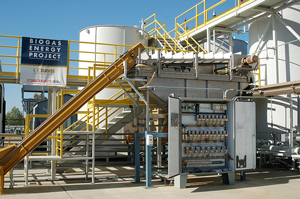Growth Energy’s Co-Chairman (Ret.) Gen. Wesley Clark, warned today that continuing dependence on petroleum for automotive fuel is not only a carbon risk, but is a security risk as well. Clark delivered this message during a side event hosted by the Danish Climate Consortium and organized by Novozymes during the COP15 conference in Copenhagen.
 Gen. Clark’s remarks were part of his speech titled, “Global Energy Security in a Climate Affected World,” where Clark noted that continuing on our dependence on imported petroleum was a dangerous course.
Gen. Clark’s remarks were part of his speech titled, “Global Energy Security in a Climate Affected World,” where Clark noted that continuing on our dependence on imported petroleum was a dangerous course.
“We suffer the inefficiencies of cartel pricing and oil shocks… Then there is the military cost to ensure steady access to foreign oil from parts of the world that are volatile, or outright hostile to Western values and policies. Taxpayers fund the defense of oil shipping routes with an estimated annual cost of more than $50 billion,” said Gen. Clark.
While expressing concerns about America’s dependence on foreign oil, he also offered a solution. “Ethanol is a low-carbon fuel – as much as 59 percent fewer greenhouse gas emissions than the production of gasoline. The most advanced technology, with closed loop biorefineries, offers us even cleaner alternatives, as much as 67 percent fewer GHGs compared to gasoline. With cellulosic ethanol, we could produce 86 percent fewer.”
Gen. Clark concluded, “What does ethanol offer us to solve this dilemma? The domestic production of nearly 6.5 billion gallons of ethanol in the United States in 2007 eliminated the need to import at least 228.2 million barrels of oil for gasoline.”




 The first commercial service station in New Jersey that offered biodiesel is celebrating the first anniversary of that historic event.
The first commercial service station in New Jersey that offered biodiesel is celebrating the first anniversary of that historic event. It could become the next great fuel source from the agricultural community. A Nebraska-based biomass supplier and manufacturer has debuted a product it touts as “Coal from the Farm.”
It could become the next great fuel source from the agricultural community. A Nebraska-based biomass supplier and manufacturer has debuted a product it touts as “Coal from the Farm.” Next Step COO Russ Zeeck explained that PowerPellets solve the logistical and operational problems that have thus far prevented wide-scale use of biomass to generate electricity. “Utilities have long been aware of the environmental benefits of burning biomass, but they’ve had a hard time adopting it,” said Zeeck.
Next Step COO Russ Zeeck explained that PowerPellets solve the logistical and operational problems that have thus far prevented wide-scale use of biomass to generate electricity. “Utilities have long been aware of the environmental benefits of burning biomass, but they’ve had a hard time adopting it,” said Zeeck. Representatives of the
Representatives of the  At the climate summit in Copenhagen, U.S. Agriculture Secretary Tom Vilsack
At the climate summit in Copenhagen, U.S. Agriculture Secretary Tom Vilsack  Under the agreement, USDA intends to increase the number of anaerobic digesters supported by USDA programs. Beyond promoting the digesters, the agreement will encourage research, and development of new technologies to help dairies reduce greenhouse gas emissions. Anaerobic digester technology is a proven method of converting waste products, such as manure, into electricity. The technology utilizes generators that are fueled by methane captured from the animal manure. Currently, only about 2 percent of U.S. dairies that are candidates for a profitable digester are utilizing the technology. Dairy operations with anaerobic digesters routinely generate enough electricity to power 200 homes.
Under the agreement, USDA intends to increase the number of anaerobic digesters supported by USDA programs. Beyond promoting the digesters, the agreement will encourage research, and development of new technologies to help dairies reduce greenhouse gas emissions. Anaerobic digester technology is a proven method of converting waste products, such as manure, into electricity. The technology utilizes generators that are fueled by methane captured from the animal manure. Currently, only about 2 percent of U.S. dairies that are candidates for a profitable digester are utilizing the technology. Dairy operations with anaerobic digesters routinely generate enough electricity to power 200 homes.  Fourteen major airlines from the United States, Mexico, Canada and Germany, led by the Air Transport Association (ATA), have agreed to buy up to 750 million gallons of renewable jet fuel and diesel derived from camelina and produced by Seattle-based
Fourteen major airlines from the United States, Mexico, Canada and Germany, led by the Air Transport Association (ATA), have agreed to buy up to 750 million gallons of renewable jet fuel and diesel derived from camelina and produced by Seattle-based 
 Moscow Mills, Missouri is the site of the state’s first ethanol blender pump.
Moscow Mills, Missouri is the site of the state’s first ethanol blender pump.  According to the
According to the